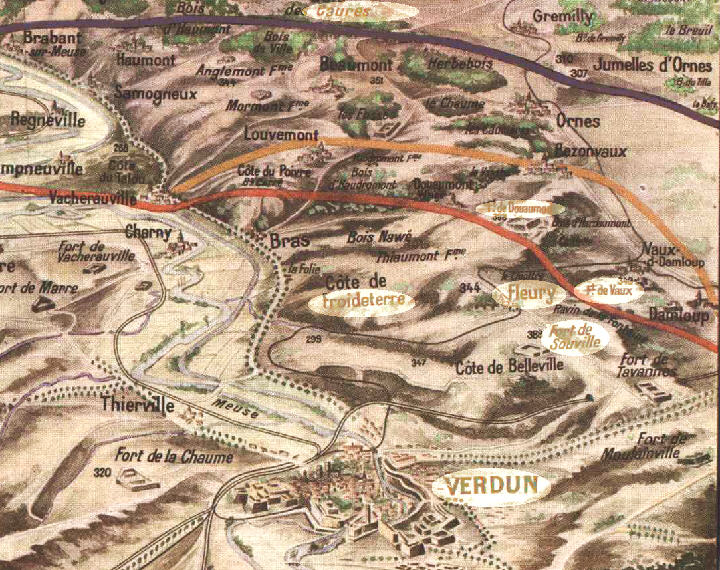Elfforkusu
Member
... the Battle of Verdun, which serves to this day as a monument to the madness of war.


To me, Verdun seems instructive because it was not a consequence of hatred -- not a slaughter between two nations fighting to the last man, convinced the other was out to destroy her (Pacific Theater or Eastern Front in WWII), but a slaughter of cold calculation. With the inventions of artilery barrages, barbed wire, trenches, and machine guns -- and with the necessary countermeasure of mobile armor (tanks) still in R&D, the only strategic path forward was to break the will of the enemy state by sheer loss of life.
The French held their ground, and ostensibly "won" the battle. But in the words of a French soldier,
100 years later:
In its futility and bloodiness, Verdun also feels like a characture of World War I itself. It is one area of many that, a century later, still remain off-limits to the general populace. Every year in France and Belgium along WWI's western front, locals dredge up -- sometimes intentionally, sometimes not -- another yield of the iron harvest.

Here are some links if you'd like to know more. In particular, Dan Carlin's descriptions of the WWI battlefields are tremendous at communicating the horrors involved. Highly recommended. If only we could make our politicians listen before advocating war...
Alistair Horne: http://www.newstatesman.com/politics/uk/2016/02/legend-verdun
Dan Carlin's Blueprint for Armageddon, Part 4 (podcast): https://www.youtube.com/watch?v=jAqpY5yCSKY
John Keegan, the First World War: http://www.amazon.com/dp/0375700455/?tag=neogaf0e-20
A peaceful scene in modern France

[A] factor peculiar to Verdun is that, whereas the fighting on the Somme, and elsewhere on the Western Front, took place in ephemeral trenches all but effaced by the passage of time, here it swirled around a ring of 19 huge forts, 14 of them reinforced with concrete. They gave the city its reputation at the time as the worlds most powerful fortress. Two of these bases were Forts Vaux and Douaumont, the latter reputed to be the strongest in the world.
Verduns sinister fame as the most atrocious battle in history also derives from the sheer concentration of the battlefield: over a period of ten months from February to December 1916, an area smaller than Manhattan was subjected without let-up to the most intensive artillery bombardment ever experienced. Most of the men who died there did so without ever seeing the enemy.

To me, Verdun seems instructive because it was not a consequence of hatred -- not a slaughter between two nations fighting to the last man, convinced the other was out to destroy her (Pacific Theater or Eastern Front in WWII), but a slaughter of cold calculation. With the inventions of artilery barrages, barbed wire, trenches, and machine guns -- and with the necessary countermeasure of mobile armor (tanks) still in R&D, the only strategic path forward was to break the will of the enemy state by sheer loss of life.
... and because, despite the cruel logic that led to the battle's design, it advanced neither side's war effort.The German commander-in-chief, General Erich von Falkenhayn, devised a bizarre strategy for his mens assault in February 1916; it was not to break through, nor even to capture a key city, but to lure the French army into a trap where it would be bled white by superior German firepower. The trap was the defence of a bastion that, for strategic, historic (and moral) reasons, the Grand Quartier Général Frances wartime headquarters could not afford to give up. The city of Verdun lay only 150 miles along the direct route from Paris, in a temptingly exposed salient on the Western Front.
(quotes from Alistair Horne: http://www.newstatesman.com/politics/uk/2016/02/legend-verdun)On 24 October, Fort Douaumont was recaptured. It is estimated that its recovery cost more than 100,000 French lives. By 19 December the Battle of Verdun was over. It had achieved nothing: a few ruined acres of France, with 800,000 casualties across the two sides, over ten months. [...] it could be judged the unnecessary battle in an unnecessary war.
The French held their ground, and ostensibly "won" the battle. But in the words of a French soldier,
They will not be able to make us do it again another day; that would be to misconstrue the price of our effort. They will have to resort to those who have not lived out these days . . .
100 years later:
In its futility and bloodiness, Verdun also feels like a characture of World War I itself. It is one area of many that, a century later, still remain off-limits to the general populace. Every year in France and Belgium along WWI's western front, locals dredge up -- sometimes intentionally, sometimes not -- another yield of the iron harvest.

Here are some links if you'd like to know more. In particular, Dan Carlin's descriptions of the WWI battlefields are tremendous at communicating the horrors involved. Highly recommended. If only we could make our politicians listen before advocating war...
Alistair Horne: http://www.newstatesman.com/politics/uk/2016/02/legend-verdun
Dan Carlin's Blueprint for Armageddon, Part 4 (podcast): https://www.youtube.com/watch?v=jAqpY5yCSKY
John Keegan, the First World War: http://www.amazon.com/dp/0375700455/?tag=neogaf0e-20
A peaceful scene in modern France
